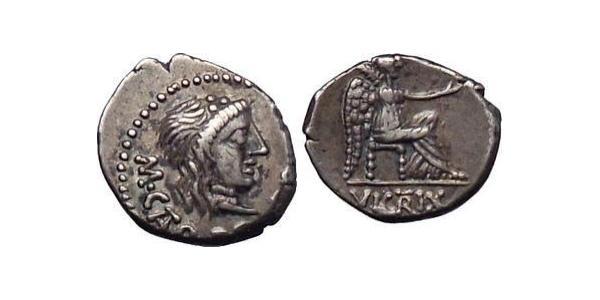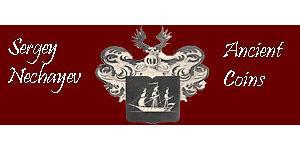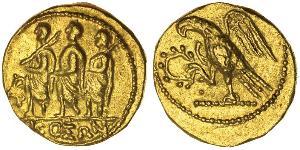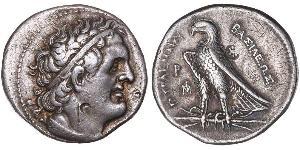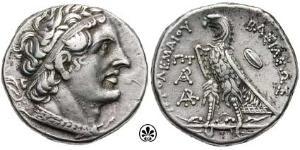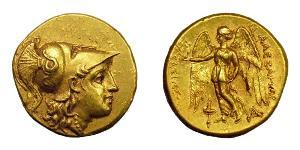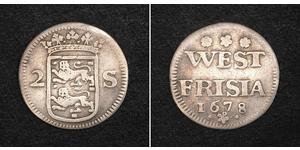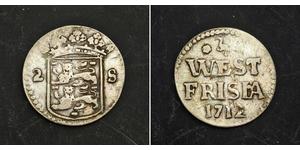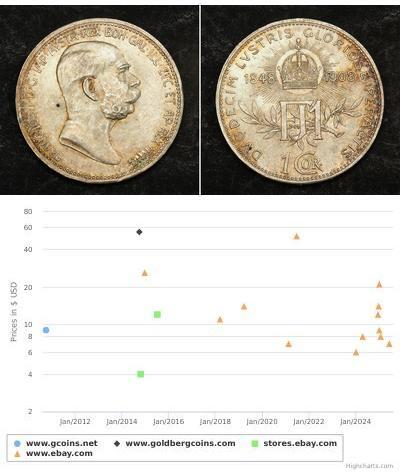[ 3272] Mark Porcius Cato, father of Cato Uticensis, the harsh opponent and enemy of Julius Caesar. Silver Quinarius (14mm, 1.73 gm), Rome, 89 B.C. Superb! Reference: Porcia 7; B.M.C. 677-693; Syd. 597c; Craw. 343/2b Head of young Bacchus or Liber right, crowned with ivy wreath, hair long, M . CATO behind, symbol below. Victory seated right, holding patera and palm, VICTRIX in exergue. Provided with certificate of authenticity. CERTIFIED AUTHENTIC by Sergey Nechayev, PhD - Numismatic Expert Marcus Porcius Cato Uticensis (95 BC, Rome – April 46 BC, Utica), commonly known as Cato the Younger (Cato Minor) to distinguish him from his great-grandfather (Cato the Elder), was a politician and statesman in the late Roman Republic, and a follower of the Stoic philosophy. He was also a famous orator. He is remembered for his legendary stubbornness and tenacity (especially in his lengthy conflict with Gaius Julius Caesar), as well as his immunity to bribes, his moral integrity, and his famous distaste for the ubiquitous corruption of the period. Biography Early life Cato was born in 95 BC in Rome, the son of Marcus Porcius Cato and his wife Livia Drusa. He lost both of his parents very early and moved into the household of his maternal uncle Marcus Livius Drusus, who also looked after Quintus Servilius Caepio, Servilia Caepionis Maior, and Servilia Caepionis Minor from Livia's first marriage (though Quintus Servilius Caepio was generally known to be Cato's full brother), as well as Porcia (Cato's full sister), and Marcus Livius Drusus Claudianus (Livius' adopted son). Drusus was murdered when Cato was 4 years old. Cato's stubbornness began in his early years. Sarpedon, his tutor, reports a very obedient and questioning child, although slow in being persuaded of things and sometimes very difficult to retrain. A story told by Plutarch tells of Quintus Poppaedius Silo, leader of the Marsi and involved in a highly controversial business in the Roman Forum, who made a visit to his friend Marcus Livius and met the children of the house. In a playful mood, he asked the children's support for his cause. All of them nodded and smiled except Cato, who stared at the guest with most suspicious looks. Silo demanded an answer from him and, seeing no response, took Cato and hung him by the feet out of the window. Even then, Cato would not say anything. Plutarch recounts a few other stories as well. One night, as some children were playing a game in a side room of a house during a social event, they were having a mock trial with judges and accusers as well as a defendant. One of the children, supposedly a good-natured and pleasant child, was convicted by the mock accusers and was being carried out of the room when he cried out desperately for Cato. Cato became very angry at the other children and, saying nothing, grabbed the child away from the "guards" and carried him away from the others. Plutarch also tells a story about Cato's peers' immense respect for him, even at a young age, during the Roman ritual military game, called "Troy", in which all aristocratic teenagers participated as a sort of "coming of age" ceremony, involving a mock battle with wooden weapons performed on horseback. While the child of one of Sulla's surrogates was chosen by the adult organizers to lead one of the "teams," the team refused to follow him because of his character, and when they were finally asked whom they would follow, the boys unanimously chose Cato. Lucius Cornelius Sulla, the Roman dictator, liked to talk with Cato and his brother Caepio, and often requested the child's presence even when the boy openly defied his opinions and policies in public (Sulla's daughter Cornelia Sulla was married to their uncle Mamercus Aemilius Lepidus Livianus). According to Plutarch, at one point during the height of the civil strife, as respected Roman nobles were being led to execution from Sulla's villa, Cato, aged about ...
читати далі

|
Добавив:
anonymous 2015-08-19 |
Similar Coin Groups
2025-05-24
- Нова монета додана до 2 Stuiver Нідерланди Срібло
2 Stuiver Нідерланди Срібло
в групі 2 монет / 2 цін
⇑
1712, Netherlands, West Friesland. Silver 2 Stuivers (Double Wappenstuiver) Coin. Condition: VF+ Mint Year: 1712 Province: Holland Reference: KM-106.1. Denomination: 2 Stuivers (Doub ...
2025-05-23
- Історичні ціни на монету
Можливо, Вас зацікавить...

